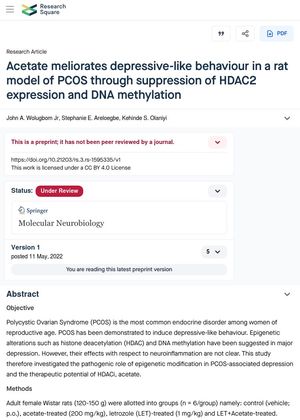Acetate Meliorates Depressive-Like Behaviour in a Rat Model of PCOS Through Suppression of HDAC2 Expression and DNA Methylation
May 2022
in “
Research Square (Research Square)
”

TLDR Acetate helps reduce depression in rats with PCOS by lowering specific gene expression and DNA changes in the brain.
The study investigated the role of epigenetic modification in depression associated with Polycystic Ovarian Syndrome (PCOS), a common endocrine disorder in women of reproductive age. The research involved adult female Wistar rats (120-150 g) divided into groups (n = 6/group). The study found that PCOS-associated depression is characterized by neuroinflammation and elevated acetylcholine (ACH) levels, linked with increased expression of histone deacetylation (HDAC2) and DNA hypermethylation in the prefrontal cortex (PFC) and hippocampus. Treatment with letrozole induced PCOS, causing hyperandrogenism, hyperinsulinemia, disrupted ovarian morphology, and depressive-like behaviors. However, these alterations were mitigated when treated with acetate, suggesting that acetate can alleviate PCOS-associated depression by suppressing prefrontal and hippocampal DNA methyltransferase and prefrontal HDAC2 expression.



